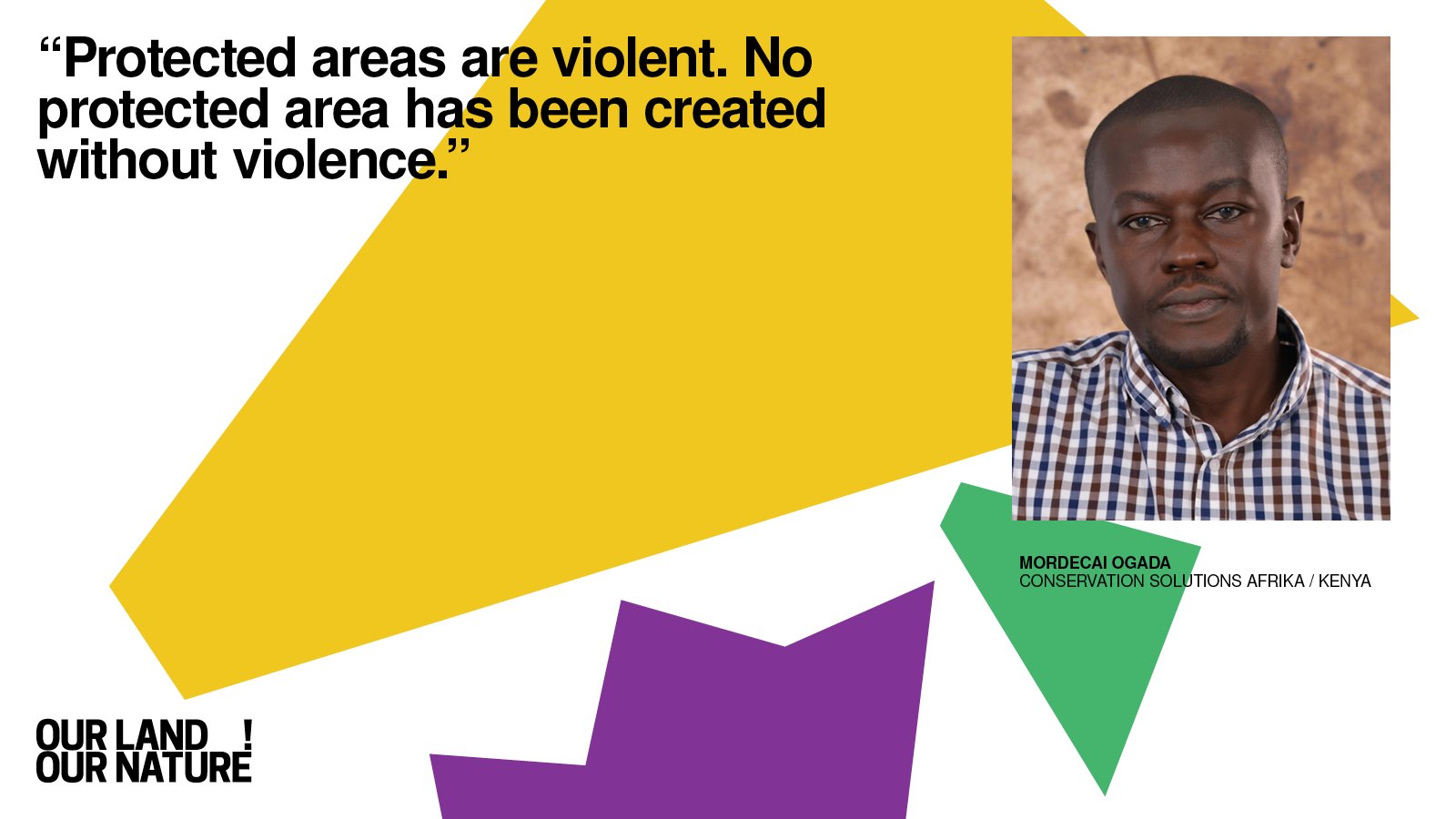Nov 14
20210
Whiteness & Aversive Racism, World Wildlife Fund (WWF)
"Nature Postive" "Protected Areas" 30x30 Africa colonization Conservation Conservation International COP26 The Nature Conservancy World Wildlife Fund (WWF)
LISTEN: Dr. Mordecai Ogada – A Case for Scrutinizing the Climate Narrative
November 13, 2021
Podcasts by Jake Marquez and Maren Morgan
“On this episode of “Death in The Garden,” as COP26 ends in Glasgow, Jake and Maren share their second interview with Dr. Mordecai Ogada, carnivore ecologist, activist for the Decolonization of Conservation, and co-author of The Big Conservation Lie. In our previous conversation with Mordecai, he mentioned the “Our Land, Our Nature” congress in Marseille, which we were lucky enough to attend and acquire this interview in person. This time we go deep into speculating about the more nefarious side of the global climate change narrative, including the obsession with the fertility of African women, the prospect of protected areas being refuges for elites, the establishment of decentralized colonies headed by colonizing NGOs, and conservation being a smoke screen for extraction and industry.
In a time where there are so many “solutions” being thrown up in the air about climate change, we feel it is very important to question everything and consider every detail. Where is the money coming from, and where is it going? Listen to Mordecai Ogada make the case for increasing our scrutiny of conservation NGOs, and demanding accountability and transparency for their dealings, as well as the narrative of climate change as a whole.”














![Mark R. Tercek is the former president and CEO of The Nature Conservancy stepping down June 7, 2019. [A #MeToo scandal engulfs The Nature Conservancy]. He is co-author of the book Nature’s Fortune: How Business and Society Thrive by Investing in Nature](https://i0.wp.com/www.wrongkindofgreen.org/wp-content/uploads/2019/09/Tercek_PES_small.jpg?resize=690%2C604&ssl=1)



![April 4, 2019, Conservation International (CI) expresses its support for "natural climate solutions". Fast facts: 2018 revenues for CI were in access of 145 million USD (145,013,840.) Wes Bush, CEO of Northrup Grumman, one of the world's largest weapons manufacturers, serves on the board of Conservation International, while Rob Walton, from the Walmart empire, serves as chairman of the executive committee. [2018 Form 990]](https://i0.wp.com/www.wrongkindofgreen.org/wp-content/uploads/2019/09/Conservation-International-April-4-2019-Forgotten-Solutions-Thunberg-Mobiot-Guardian.png?resize=530%2C638&ssl=1)
![Conservation International, A New Deal for Nature: "Countries are in the process of negotiating a new global biodiversity framework through the Convention on Biological Diversity (CBD), which has been called a “New Deal for Nature.” This pact, expected to be agreed in Beijing in late 2020, will lay out the global strategy for protecting nature through 2030." Identified in the Level 2 Actions for "mainstreaming biodiversity" is "incorporating the value of biodiversity into national accounting processes". [Source]](https://i0.wp.com/www.wrongkindofgreen.org/wp-content/uploads/2019/09/NDFN-CI.png?resize=690%2C419&ssl=1)

![Nature4Climate Voices, Paul Polman: served in senior leadership roles at both Nestlé and Procter & Gamble prior to becoming CEO of Unilever (2009-2018), B Team chair, chair of the International Chamber of Commerce, appointed to the U.N. Secretary General’s High-level Panel responsible for developing the Sustainable Development Goals (SDGs), founding member of the World Business & Sustainable Development Commission, U.N.-appointed SDG Advocate, leading member of Financing Capitalism for the Long-Term (FCLT), the Coalition for Inclusive Capitalism, the Global Commission on the Economy and Climate and the Food and Land Use Coalition (which he chairs), counsellor and chair of the Global Advisory Board of One Young World (co-founded by “B Team expert” David Jones), named an Honorary Knight Commander of the Order of the British Empire (KBE) for services to business in 2018, a non-executive director of Dow since 2010. Stern also serves as commissioner to the Energy Transitions Commission and has been selected to serve as a One Planet Lab member, the aforementioned high-level advisory group steered by the French Government. [Further reading: The New Green Deal is the Trojan Horse for the Financialization of Nature, Volume I, Act V and A Design to Win — A Multi-Billion Dollar Investment, Volume II, Act I]](https://i0.wp.com/www.wrongkindofgreen.org/wp-content/uploads/2019/09/Polman-Nature4Climate.png?resize=690%2C218&ssl=1)
![Nature4Climate Voices, Christiana Figueres: former executive secretary of the United Nations Framework Convention on Climate Change (UNFCC) from 2010 to 2016, vice-chair of the Global Covenant of Mayors for Climate & Energy, ClimateWorks Board Member, World Bank Climate Leader, B Team leader, leader of Mission2020, and board member of both the World Resources Institute and Unilever. Figueres is also identified as a “distinguished member” of Conservation International. [Further reading: To Plunder What Little Remains: It’s Going To Be Tremendous, Volume II, Act III]](https://i0.wp.com/www.wrongkindofgreen.org/wp-content/uploads/2019/09/Figueres-Nature4Climate.png?resize=690%2C218&ssl=1)
![Nature4Climate Voices, Nicolas Stern: international advisor to the Global CCS Institute, co-chair of the Global Commission on the Economy and Climate overseeing The New Climate Economy, chair of SYSTEMIQ board of directors, former World Bank chief economist. [Further reading: A Design to Win — A Multi-Billion Dollar Investment, Volume II, Act I]](https://i0.wp.com/www.wrongkindofgreen.org/wp-content/uploads/2019/09/Stern-Nature4Climate.png?resize=690%2C286&ssl=1)
![Nature4Climate Voices, Achim Steiner: UNDP Administrator, and former advisory board member of The Economics of Ecosystems and Biodiversity (TEEB - now the Natural Climate Coalition, i.e. the financialization of nature), voice for the 2009 Green New Deal [Further reading: They Mean Business [Volume II, Act IV]](https://i0.wp.com/www.wrongkindofgreen.org/wp-content/uploads/2019/09/Steiner-Nature4Climate.png?resize=690%2C208&ssl=1)




![September 3, 2018, Global Landscapes Forum. During the closing remarks of the Global Landscapes Forum on December 9, 2018, at COP24, Jennifer Morgan, executive director of Greenpeace International stressed that in addition to shifting global focus from the oil and transportation sectors to land and forests, additional co-operation was required to reach consensus on the New Deal for Nature.[Further reading: The House is On Fire! & the 100 Trillion Dollar Rescue, Volume I, ACT VI] The GLF was formed in 2013 by the World Bank, the Center for International Forestry Research (CIFOR) and the United Nations Environment Programme](https://i0.wp.com/www.wrongkindofgreen.org/wp-content/uploads/2019/09/Global-Landscape-Forum-Sept-3-2018-Forgotten-Solutions.png?resize=595%2C302&ssl=1)


![December 10, 2018, Achim Steiner promotes the "Forgotten Solutions". Steiner will appear this week at the Social Good Summit (founded and/or financed by the UN, Purpose, Gates Foundation, etc.) with Greta Thunberg and Christiana Figueres. Steiner, UNDP Administrator is a former advisory board member of The Economics of Ecosystems and Biodiversity (TEEB). TEEB, initiated in 2008, and officially launched in 2012, hosted by UNEP and backed by the European Commission and countries including Germany, Norway, and the United Kingdom, has since been absorbed/rebranded into the Natural Capital Coalition. The Natural Capital Coalition is working with the world’s most powerful corporations and institutions for the implementation of the financialization of nature.]](https://i0.wp.com/www.wrongkindofgreen.org/wp-content/uploads/2019/09/UNREDD-December-10-2018-Steiner-Forgotten-Solutions.png?resize=538%2C625&ssl=1)















































































































![The Thunberg-Monbiot film, emphasizing the urgency of funding “natural solutions”, was paid for by Conservation International and the aforementioned *Food and Land Use Coalition, with “guidance” provided by Nature4Climate (The Nature Conservancy, We Mean Business, WWF, UN-REDD, et al.) and Natural Climate Solutions. [*Member foundations include ClimateWorks, the David & Lucile Packard Foundation, the Ford Foundation, the Gordon & Betty Moore Foundation, Good Energies, and Margaret Cargill.]](https://i0.wp.com/www.wrongkindofgreen.org/wp-content/uploads/2019/09/Natural-Climate-Solutions-Nature-Conservancy.png?resize=369%2C431&ssl=1)


















































